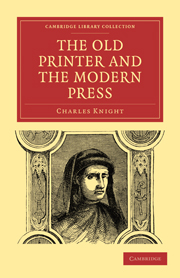Summary
The history of Cheap Popular Literature is a long and instructive chapter of the history of the condition of the People. Before the invention of printing there was little literature that could be called popular, and none that could be called cheap. But in the very earliest stages of the press all books would be comparatively cheap, and all literature to a certain extent popular. Our first printer, as we regard his works, had a most especial eye to the largest number of readers. We have no record of the price of his books beyond the fact that one of them was sold for 6s. 8d., a price equal to that of a quarter of wheat. But the subjects of his books, for the most part, show that he thought it his especial business to simplify knowledge, and to furnish reading for amusement. We can scarcely call any of his books learned. What there is of science in them was of a popular sort, and illustrated by diagrams. The histories were those of our old legendary chronicles, as attractive even as the romances of chivalry which accompanied them. His poetry was chiefly that of one of the great minds whose essential attribute is that of universality. Caxton went to the largest number of readers that his age presented to him.
- Type
- Chapter
- Information
- The Old Printer and the Modern Press , pp. 179 - 196Publisher: Cambridge University PressPrint publication year: 2010First published in: 1854



